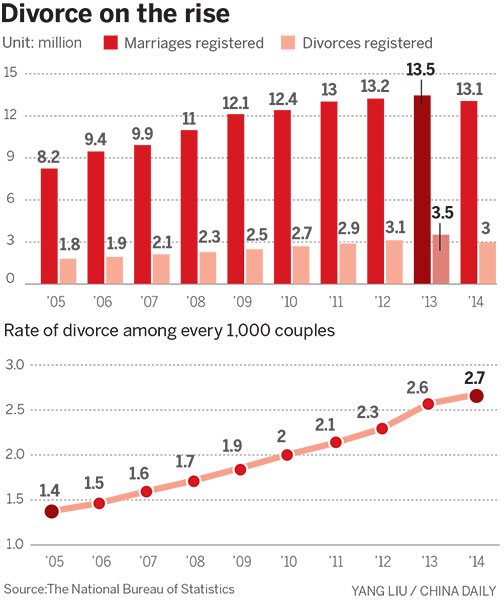Love affair with the city ending marriages
By Zhou Wenting (China Daily) Updated: 2016-03-28 09:22
 |
|
YANG LIU/CHINA DAILY |
Such breakups are often the result of many things going wrong over a long period of time. Marriage breakdowns can involve violence, both physical and verbal, and economic control, said Chen Yandi, founder of Hand-In-Hand, a non-governmental organization dedicated to protecting the rights of female workers in Shenzhen, Guangdong province.
Qiu Yan from rural Jiangsu province tied the knot with her ex-husband in 2006 at the age of 22. Not long after the marriage, her introverted partner became addicted to gambling and Qiu said she endured his beatings when he lost.
"Moreover, my mother-in-law's attitude toward me was as if she was venting all her spite from decades of bitterness that she had got from being bullied by her own mother-in-law. That home was like a prison for me," said Qiu.
She, too, went to Shanghai and worked in a hotel while her husband drove an illegal cab in Nanjing.
While working at the hotel, she drew the attention of a security guard who also worked there and the couple hit it off and eventually began dating.
Lin, the consultant, said many women strongly desire independence and freedom from abusive relationships once given the chance to change their lives.
"They believe whatever the new life will be like, it won't be worse than the previous one," Lin said.
Qiu divorced her ex-husband in 2012 and moved in with her new partner.
"In rural regions, usually we don't have the right to choose our marriages, so, when they end, the relationship collapses more easily," Qiu said.
Easy option
Xiao Xue (not her real name) grew up in a rural area in Chongqing municipality where she was engaged to a man her own age.
She never dreamed she would be bold enough to end their engagement, but Xiao left home for Guangzhou at age 18 in 2008 and worked as a waitress in a karaoke bar.
She loved the glitzy city life and, when her mother died in an accident, she felt as if there was no reason to leave the city.
"There was nothing left that made me want to return to the village," she said. Instead, she met the owner of a barbershop and began working there.
"He was 20 years older than me and he was divorced," said Xiao.
She said she saw the prospect of marrying the barber as a once-in-a-lifetime chance to change her destiny and leave the countryside forever.
"Everybody pursues a better life and the nation is advocating the urbanization of the rural areas. Why wouldn't I stay in the city?" said Xiao, who got married last year and became manager of the barbershop.
For many without the option of improving themselves through education, marriage is seen as a fast-track way for women to secure their place in the city. Traditionally in China, women seek a man with a higher social standing than themselves anyway, so finding a husband in the city seems to fit with that, sociologists say.
But marrying or remarrying is far from a perfect route to hanging on to the city life.
"It will take someone at least 10 years to obtain a permanent residence permit for a big city like Beijing or Shanghai, which means women will not be able to gain equal access to social welfare as other citizens within this period," Xue, the researcher, said. "And in the meantime, there are abundant variables in a marriage during those 10 years."
She said that women who stay in the rural areas and find ways to be fully involved in the running of their families and in the upbringing of their children will earn the respect of their families.
Social experts point out that the flow of women out of rural areas and into the big cities and the resulting pressures that the migration puts on marriages will not dry up until the underlying issue-the urban-rural divide-is addressed.
Contact the writer at zhouwenting@chinadaily.com.cn
- New KMT chief 'to remain on peaceful path'
- China terminates paid services in military
- Love affair with the city ending marriages
- Internet stardom brings fast fortune
- Joint funds seek to protect water supply
- Industrial companies show profit uptick after tough 2015
- Hung Hsiu-chu elected Kuomintang leader
- Li welcomes foreign help with China transition
- Baidu develops AI algorithm to predict crowds, avoid stampedes
- China and UK team up in smart city development







